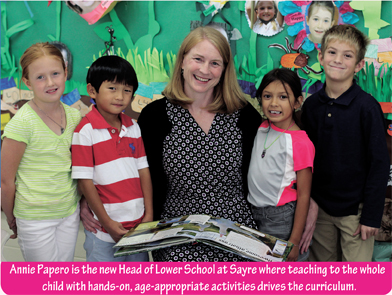Teaching The Whole Child
Research Proves That Children Learn Best by Doing, Says Sayre’s New Lower School Head, Annie Papero
By John Lynch
 Don’t expect to see many elementary students at Sayre School using worksheets in class. Not with new Lower School Head Annie Papero on campus.
Don’t expect to see many elementary students at Sayre School using worksheets in class. Not with new Lower School Head Annie Papero on campus.
Through her years of research in early education, Papero knows that to develop creative thinkers and problem solvers, children need hands-on, age-appropriate activities where they are actively engaged in the learning process.
Children construct their conceptual understandings by interacting directly with their environment and a broad range of ideas.
Swiss developmental psychologist Jean Piaget suggested that the work of children is “play,” and Sayre takes this into consideration as it crafts its curriculum for young children.
“My goal is to provide experiences for our students that represent best practices, and the research shows that children learn best by doing,” said Papero, who joined Sayre this summer.
“We provide a balanced curriculum that teaches strong academic skills in a context that makes sense to children.”
Papero is an ideal fit at Sayre because of her research background, her work training teachers and her experience in the classroom.
“She is first class when it comes to knowledge about child development,” Head of School Stephen Manella said.
“She has expertise, enthusiasm and is very approachable. We believe she can connect with students, inspire teachers and collaborate with parents.”
Papero, whose son and daughter attend Sayre, spent seven years as an elementary and preschool teacher before earning her doctorate degree in child development at Virginia Tech.
She worked for 10 years at the university level conducting research and training teachers, and also directed the Lucy Brock Child Development Lab Programs at Appalachian State.
Papero’s mission is to capitalize on the existing strengths at Sayre, which has a rich history of teaching to the whole child.
The school’s Responsive Classroom approach helps Lower School students learn how to cultivate respectful relationships and classrooms.
“We understand that children need to be guided in how to behave and how to build positive relationships in the same ways that they need to be taught academic skills,” she said.
“We try to proactively support children in building friendships and appropriate classroom behavior, rather than simply reacting when they make mistakes in these areas.”
Like Manella, Papero was drawn to Sayre because it’s a “school that values relationships, community and diversity.”
“I was looking to return to working more directly with children and families,” she said.
“This position pulls together the skills I have developed over the years. I was looking for a place to put best practices in place and Sayre was a great fit.”
The wholistic educational approach encompasses emotional, cognitive, physical and social development of the child, all of which are intrinsically linked to academic success, Papero said.
One manifestation of that approach is the new Innovation Room, a work space that reflects the school’s vision.
The room is filled with found objects like buttons, old CDs, toilet paper rolls, rocks, just about anything.
An adult may wonder what is supposed to happen here. A child, fueled by natural curiosity, digs in and starts to create.
“We all learn in a social context,” Papero said, “so when a whole class is here the work can lead to debate and discussion among the students.”
Papero also kicked off the school year by having the families and faculty of the entire Lower School create scrapbooks of themselves. This is a visual reminder that the community is responsible for creating supportive networks around children.
“We want Sayre to be a safe home for every family who comes to us,” she said. “We want to be known for our strong academics, our welcoming environment and the value we place on kindness.”
The Lower School consists of grades 1-5, full-day kindergarten, plus a number of preschool choices for children 2 through 5 years old, including a multi-age Montessori program and half-day programs for 2s, 3s, and 4s.
All of those classes can be paired with the Extended Day program.
In addition, Sayre has toddler enrichment programs for children under 2. Little Artists, Little Musicians and Little Readers meet for 45 minutes one day a week with a parent or caregiver.
Said Papero of her new job: “Life in the Lower School is full of opportunities to try something new, to take a risk without fear of failure, to build new friendships and to gain a solid foundation in the academic skills that are the building blocks for success in middle school and beyond to our global world.”

